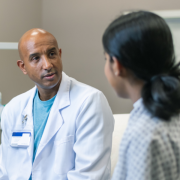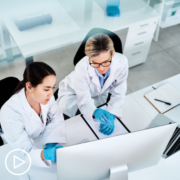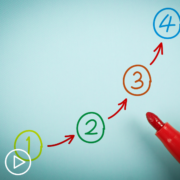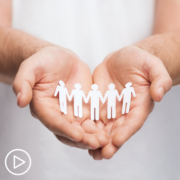Addressing Racial Disparities in CLL Care
Addressing Racial Disparities in CLL Care from Patient Empowerment Network on Vimeo.
How are CLL racial disparities being addressed? Dr. Adam Kittai explains abstracts presented at the American Society of Clinical Oncology (ASCO) 2022 conference that examined CLL disparities and shares resources for patients who feel they’re struggling to receive equitable care.
Dr. Adam Kittai is a hematologist and an assistant professor at the The Ohio State University Comprehensive Cancer Center – The James. Learn more about Dr. Kittai, here.
See More from CLL Clinical Trials 201
Related Resources:

|

|

|
Transcript:
Katherine:
We touched on research at the top of the program, but are there other areas of research that you’re excited about and that patients should know about?
Dr. Kittai:
Yeah, so one of the things that I think is being really talked about in cancer care – and medical care in general – is if disparities exist between minority patients and white patients. And I think this is a really, really important topic.
So, the American Society of Clinical Oncology, which had the conference recently, really made this a mainstay point of the conference this year and there were a lot of abstracts that were defining whether disparities exist and hopefully, by defining whether disparities exist, we’re able to target those disparities in order to make outcomes equal for all of our patients.
So, in the CLL world, one of the things that I alluded to is a lot of our therapies can be really expensive. So, these new therapies are really expensive, they really widen the disparity gap for patients who are minorities, as well as patients who come from socioeconomic status.
Katherine:
Absolutely.
Dr. Kittai:
And so, there were two abstracts. One was an oral presentation that looked at the National Cancer Database in ASCO that showed that Black patients do have worse overall survival than white patients. And then, I actually did my own study looking at the SEER database, which also showed the same exact thing. Even when controlling for socioeconomic status.
So, I think addressing these disparities, making sure that there’s equity amongst our patients, that everyone has access to these drugs and can afford them, especially when they make our patients live longer and are safer than chemoimmunotherapy in CLL is very, very important.
Katherine:
Dr. Kittai, if a patient feels like they’re not getting equitable care, are there resources available for them?
Dr. Kittai:
Yeah, so one of the things that I love about the CLL society, is that they have a section called Access an Expert, I believe. So, look on the website, I’m not sure it’s actually called Access an Expert, but it’s a way for all patients to get a second opinion from one of the CLL experts listed on the website. And so, if somebody is feeling like they’re not getting access to the most beneficial treatment, for whatever reason, seeking a second opinion and using the CLL Society’s website to find that second opinion, I think would be a great way for someone who feels that way to get access to the care that they deserve.
I believe there are other ways to do this through the Lymphoma Research Foundation, as well as LLS. But I know for sure on the CLL Society, there is a link that you can click that you can get access to a second opinion.






